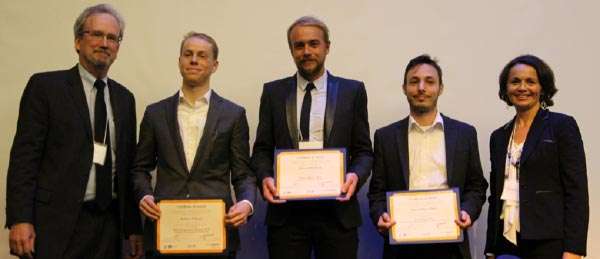 NIDA International Program Director Steven W. Gust, Ph.D., left, and Mireille Guyader, Ph.D., Inserm, right, announced the first researchers awarded NIDA-Inserm Postdoctoral Drug Abuse Research Fellowships. The new fellows are, from left: Andrew Scheyer, Ph.D. candidate, Rosalind Franklin University of Medicine and Science; Vivien Zell, Ph.D., University of Strasbourg; and Yann Pelloux, Ph.D., Aix Marseille University.
NIDA International Program Director Steven W. Gust, Ph.D., left, and Mireille Guyader, Ph.D., Inserm, right, announced the first researchers awarded NIDA-Inserm Postdoctoral Drug Abuse Research Fellowships. The new fellows are, from left: Andrew Scheyer, Ph.D. candidate, Rosalind Franklin University of Medicine and Science; Vivien Zell, Ph.D., University of Strasbourg; and Yann Pelloux, Ph.D., Aix Marseille University.Researchers from France and the United States presented research posters and exchanged ideas about binational research during the 2nd Workshop on France-USA Collaborative Initiatives in Addiction. Topics included addiction-related neuroimaging research, marijuana and alcohol research in an era of changing laws and policies, and the potential offered by large biorepositories to expand research into the genetics of addiction. NIDA Director Nora D. Volkow, M.D., and Mohamed Jaber, Ph.D., Laboratoire de Neurosciences Expérimentales et Cliniques, Poitiers, France, co-chaired the roundtable discussion. Speakers included National Institute on Alcohol Abuse and Alcoholism (NIAAA) Director George Koob, Ph.D., who discussed the epidemiology of binge drinking among young people, and Jean-Pierre Changeux, Ph.D., Institut Pasteur, who reviewed advances in drug abuse neuroscience research. NIDA International Program Director Steven W. Gust, Ph.D., and Mireille Guyader, Ph.D., Institut National de la Santé et de la Recherche Médicale (Inserm), introduced the first researchers awarded NIDA-Inserm Postdoctoral Drug Abuse Research Fellowships, which provide 6 to 12 months of rigorous postdoctoral research training in the United States (for French applicants) or France (for U.S. applicants). The meeting was cosponsored by NIDA, NIAAA, Alliance Nationale pour les Sciences de la Vie et de la Sante (Aviesan), and Inserm. In addition, NIDA supported Dr. Changeux’s travel. The meeting was held at the Embassy of France on November 18, 2014, in Washington, DC. Other NIDA participants included Joni Rutter, Ph.D., and Jonathan Pollock, Ph.D., Division of Basic Neuroscience and Behavioral Research; Joseph Frascella, Ph.D., Division of Clinical Neuroscience and Behavioral Research; International Program Associate Director Dale Weiss; and Antonello Bonci, M.D., Yavin Shaham, Ph.D., and Amina S. Woods, Ph.D., Intramural Research Program.
The new NIDA-Inserm Fellows are:
- Vivien Zell, Ph.D., University of Strasbourg, will investigate how glutamate-releasing neurons in the ventral tegmental area (VTA) contribute to brain function at the molecular, physiological, and behavioral levels and alter the reinforcement mechanisms that contribute to addiction. By identifying and assessing the function of genes enriched in VTA glutamate neurons, his results may suggest new targets or strategies to prevent or treat addiction. Dr. Zell also will investigate whether dopamine and glutamate are released from the same or separate synaptic vesicles, an important concept in presynaptic plasticity of the central nervous system. Dr. Zell’s mentor is Thomas Hnasko, Ph.D., University of California, San Diego.
- Yann Pelloux, Ph.D., a postdoctoral researcher at the Centre national de la recherché scientifique (National Center for Scientific Research) at Aix Marseille University. During his postdoctoral research at the University of Cambridge, Dr. Pelloux established an animal model of cocaine seeking and relapse that demonstrated a subset of rats would continue seeking cocaine despite punishment, which mimics human patterns of addiction. Dr. Pelloux will use his NIDA-Inserm Fellowship to build on his Cambridge studies that found forebrain differences between compulsive and noncompulsive rats. Dr. Pelloux will use brain imaging and optogenetic techniques to compare neuronal activity in various brain regions and identify the neural networks involved in compulsive cocaine use and context-induced relapse. Dr. Pelloux’s mentor is Shaham Yavin, Ph.D., Intramural Research Program.
- Andrew F. Scheyer, Ph.D. candidate, Rosalind Franklin University of Medicine and Science. Mr. Scheyer will study adult rats to examine the consequences of prenatal or adolescent exposure to the primary active ingredient of cannabis, ∆-9 THC. He will investigate whether cannabis exposure disrupts short- and long-term plasticity in the brain and if these functional changes contribute to behaviors that increase addiction vulnerability. In addition, he will test the viability of interventions using endocannabinoids to correct the behavioral consequences of prenatal and adolescent exposure to ∆-9 THC. Mr. Scheyer’s mentor will be 1997 NIDA INVEST Fellow Olivier Manzoni, Ph.D., Institut de neurobiologie de la méditerranée, in Marseille, France